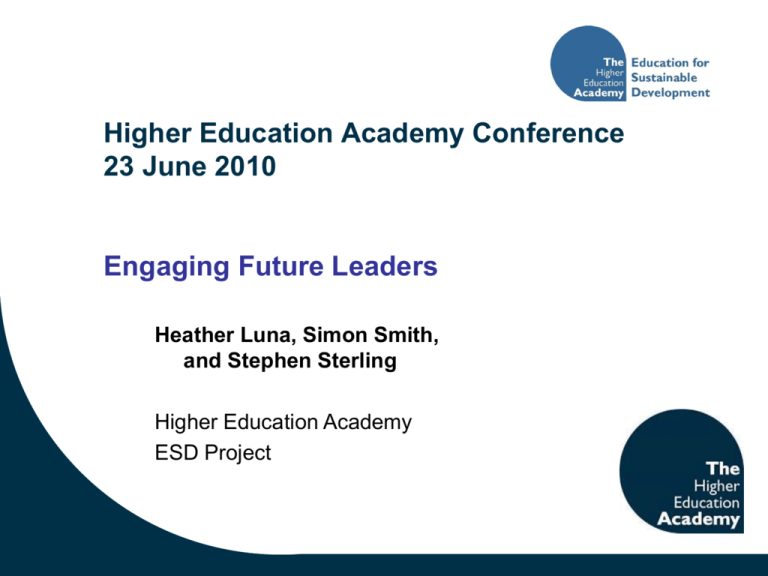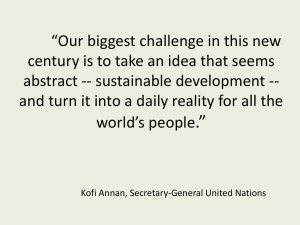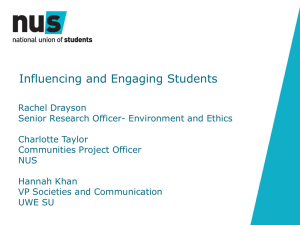simon_smith_23jun_1330
advertisement

Higher Education Academy Conference 23 June 2010 Engaging Future Leaders Heather Luna, Simon Smith, and Stephen Sterling Higher Education Academy ESD Project Aims of the Session • To consider the skills that will enable graduates to be sustainability literate • To examine current thinking and practice in skills development in ESD • To look at the gaps between desired positions and actual practice, and discuss how these can be bridged Post-It Notes What skills should sustainability-literate graduates possess? Academy ESD Project • Began 2005 in line with UN Decade of ESD • ‘Dawe report’ – skills (p31): – Interdisciplinary skills – Ethical skills and the skills necessary to put sustainability into practice – Critical and reflective thinking – Knowledge of the practical impacts that their decisions will have – Awareness of the facts surrounding sustainability challenges, and the skills necessary to play a part in their solution Academy ESD work • • • • Commissioned reports Events Publications Funded small grants to develop and share good practice • Newsletter and bulletin (sustainability@heacademy.ac.uk) • Networking: SHED / ESDGC group in Wales • Website: www.heacademy.ac.uk/esd Employable Graduates for Responsible Employers – undertaken by StudentForce for Sustainability – surveyed students, employers, careers advisors The Evidence The trend to more responsible employers is affecting the graduate job market and the demand for more particular competencies from recent graduate recruits. The graduate employability agenda is now closely linked to the employer sustainability agenda. There is mounting evidence that, and media coverage about how, students want to work for ethical employers who are environmentally and socially responsible. Many HEIs are responding to the challenges of ESD through institutional changes in terms of ‘Campus, Curriculum and Community’, but not so much in terms of competencies or careers. Small and Mini-Grant Funding • Experiencing Sustainable Development (Brighton) • Making Sustainability Real (QUB) • Are Employers Seeking Sustainability-Literate Graduates? (Kingston) • Developing Participative ESD to Enhance Links between Sustainability Literacy, Sustainability Competencies, and Employability (UWE) • Development of Sustainability Skills through Volunteering (London Met) Small and Mini-Grant Funding • Greening Business: Employability and Sustainability (Keele) • Improving Student Awareness of SD and Related Employability Issues through Embedded Course Content (Hull) • Soundings in Sustainability Literacy (Glos) • ESD in the Professional Curriculum (Dundee) What do we want our students to be? ‘Where should priorities lie?...in a period of considerable change, it is important for universities to reflect on questions of purpose and value as well as solutions to immediate dilemmas...such reflection constitutes a valuable tool for navigating the uncertain waters of contemporary higher education and providing strong orientation for the future.’ - Prof David Greenaway , 2010 Centre for Integrative Studies ‘The future isn’t what it used to be’ peak oil global warming unsustainability uncertainty insecurities dense interdependence stresses globalisation complexity ecosystem degradation inequity overconsumption population pressures Future Leaders Survey 07/08 25 000 applicants to universities and colleges surveyed ‘The survey paints a picture of a generation that is intensely aware of the big challenges facing the planet and eager to see broader social and political change…..’ - Forum for the Future/ UCAS 2008 David Holmgren – Future Scenarios 2009 The call to respond To meet the challenge of climate change, ‘the world needs minds capable of creating new possibilities’. HE provides a ‘vital platform’ for the transition to a low carbon economy, in order to ‘safeguard a secure future’ - Lord Stern, Foreword to HEFCE’s current strategic statement and action plan Sustainable Development in Higher Education (2009) ‘Daunting agenda…exciting possibilities’ Nine challenges • • • • • • • • Power civilisation by sunlight Grow food and fibre sustainably Dis-invent the concept of waste Preserve biodiversity Restore ruined ecologies Reduce materials, water and land use per head Rethink the political basis of modern societies Develop economies that can be sustained within nature’s limits • Distribute wealth fairly within and between generations - David Orr What would you suggest is important? A) Attitudes; values; dispositions B) Understanding, knowledge, concepts C) Skills, practical abilities Sustainability competence (Gestaltungscompetenz) (Germany) • Competence to work in an interdisciplinary manner • Competence to achieve open-minded perception transculturalunderstanding and cooperation • Participatory competence • Planning and implementation competence • Ability to feel empathy, sympathy and solidarity • Competence to motivate oneself and others • Competence to reflect in a distanced manner on individual and cultural concepts • Competence to think in a forward-looking manner, to deal with uncertainty, and with predictions, expectations and plans for the future Closing the gaps…. Current practice Barriers? Possibilities? Desirable outcomes (graduate qualities and skills) Small Group Discussions: 20 minutes Feedback New book....







